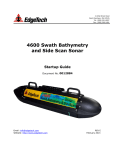Download Furuno GP-320B GPS Receiver User Manual
Transcript
GPS RECEIVER GP-320B SAFETY INSTRUCTIONS CAUTION NOTICE Confirm that the power supply voltage is compatible with the voltage rating of the equipment. No one navigation device should ever be solely relied upon for the navigation of a vessel. Connection to the wrong power supply can cause fire or damage the equipment. Always confirm position against all available aids to navigation, for safety of vessel and crew. i TABLE OF CONTENTS SYSTEM OVERVIEW........................................................................................... iii EQUIPMENT LISTS .............................................................................................. v 1. MOUNTING ....................................................................................................... 1 2. WIRING ............................................................................................................. 2 3. DEFAULT SETTINGS ....................................................................................... 6 4. TROUBLESHOOTING, BATTERY ................................................................... 7 SPECIFICATIONS........................................................................................... SP-1 PACKING LIST OUTLINE DRAWING Declaration of Conformity ii SYSTEM OVERVIEW The GP-320B is a GPS receiver with WAAS (Wide Area Augmentation System) capability. WAAS, available in North America, is a provider in the worldwide SBAS (Satellite Based Augmentation System) navigation system. An SBAS provider furnishes GPS signal corrections to SBAS users, for even better position accuracy, typically better than three meters. Two more SBAS providers are also currently under development, MSAS (Multi-Functional Satellite Augmentation System) for Japan and EGNOS (Euro Geostationary Navigation Overlay Service) for Europe. All providers will be compatible with one another, thus providing “seamless” position fixes to SBAS users. SBAS is currently in the developmental phase and SBAS providers are expected to have initial operations capability from the times shown below. During the developmental phase the reliability and availability of the SBAS signal cannot be guaranteed. 150°W 120°W 90°W 60°W 30°W 0 30°E 60°E 90°E 120°E 150°E 60°N 60°N EGNOS 40°N MSAS 40°N 20°N 20°N 122 0 120 134 131 0 WAAS 20°S 20°S 40°S 40°S 60°S 60°S 150°W 120°W Satellite, Region 120, AOR-E 122, AOR-W 131, IOR 134, POR 90°W 60°W Position 15.5°W 54°W 64.5°E 178°E 30°W 0 30°E 60°E 90°E 120°E 150°E Expected operations capability WAAS: 2003 EGNOS: 2004 MSAS: 2005 Note: Unless otherwise noted, this manual uses “WAAS” when referring to any SBAS provider. iii NavNet Series Model 1722C Model 1722 Model 1732C Model 1732 Model 1742C Model 1742 Model 1752C Model 1752 Model 1762C Model 1762 Model 1833C Model 1933C Model 1943C Model 1833 Model 1933 Model 1943 Model 1953C GD-1900C GD-1700C GD-1700 Multi Display RD-30* Echo Sounder LS-6100 * = WAAS is inoperative. Other Equipment* GD-XXXX GR-80 Ship's Mains (12-24 VDC) JUNCTION BOX iv EQUIPMENT LISTS Standard supply Name GPS Receiver Type GP-320B Code No. Qty Remarks 1 With 10 m cable Code No. Qty Remarks Optional equipment Name Type Cable Assembly MJ-A7SPF/SRMD-100 000-144-534 1 Mast Mounting Kit CP20-01111 004-365-780 1 NO.13-QA330 000-803-239 1 NO.13-QA310 000-803-240 1 NO.13-RC5160 000-806-114 1 Right Angle Antenna Base L-angle Antenna Base Handrail-mount Antenna Base v 7P-7P, straight, 10 m (This page intentionally left blank.) vi 1. MOUNTING Mounting considerations Follow the guidelines below to choose a suitable mounting location for the antenna unit. • The antenna may be mounted three ways: screwed into a pipe (local supply), fixed to a post with the optional mast mounting kit, or screwed into an optional mounting base. For fixing by the post or pipe, it is recommended to use stays to prevent damage to the GPS receiver. • Select a location out of the radar beam. The radar beam will obstruct or prevent reception of the GPS signal. • The location should be well away from a VHF antenna. A GPS receiver is interfered by a harmonic wave of a VHF antenna. • The location should be well away from an Inmarsat antenna. Inmarsat transmission will obstruct or prevent reception of the GPS signal. • There should be no interfering object within the line-of-sight to the satellites. Objects within line-of-sight to a satellite, for example, a mast, may block reception or prolong acquisition time. • Mount the antenna unit as high as possible to keep it free of interfering objects and water spray, which can obstruct reception of the GPS signal if the water freezes. • Observe the following minimum separation distances from other antenna units. LOOP ANTENNA WHIP ANTENNA(VHF/UHF) RX WHIP ANTENNA INMARSAT ANTENNA 3m a 1m 1m * GPS ANTENNA 5 m NOT WITHIN INMARSAT BEAM 0.5 m * = DISTANCE DEPENDS ON MAST DIAMETER OF ’a’. 10 cm 30 cm 4m 4m 1.5 m MAIN MAST NOT WITHIN RADAR BEAM DIA. OF ’a’ WHIP ANTENNA(MF/HF) TX ANTENNA(MF/HF) DISTANCE (MIN.) 1.5 m 3m Mounting procedure Install the antenna unit by referring to the installation diagram on page D-1. 1 2. WIRING This unit outputs position and speed to external equipment. NavNet equipment, Multi Display RD-30 and Echo Sounder LS-6100 can be connected directly. For connection to other equipment, use a junction box (local supply) which has seven terminals. The antenna cable is 10 meters long. If the distance between the antenna unit and the display monitor is more than 10 meters, use the optional cable assy. (10 m). Up to four extension cables can be connected serially. Connecting to FURUNO NavNet equipment Connect the antenna cable to the DATA1 port on NavNet equipment. Antenna Cable 10 m Cable assy. (option) MJ-A7SPF/SRMD-100 10 m (max. 4) NavNet DATA 1 port Total length: Max. 50 m Waterproofing connectors If you use the cable assy.(s), waterproof their connectors by wrapping them with vulcanizing tape and then vinyl tape. Bind tape ends with suitable cable-ties. 2 Connecting to Multi Display RD-30 WAAS is not operative in this installation. Antenna Cable 10 m AUX port MULTI DISPLAY RD-30 AUX 12-24 VDC 12-24 VDC IN/OUT IN/OUT port Rear Panel Connecting to Echo Sounder LS-6100 Antenna Cable 10 m ECHO SOUNDER LS-6100 NMEA NMEA XDR POWER 12VDC 12 VDC POWER REAR 3 Connecting to other equipment Remove the connector from the antenna cable and attach crimp-on lugs or similar terminals to the cable’s cores. Connect the cores to the junction box as below. Antenna Cable 10 m *: RS-422 signal can be received by using current loop. JUNCTION BOX YELLOW GREEN WHITE BLUE RED BLACK Drain Wire non-NavNet equipment 3 RD-A RS-422* input for radar/plotter 4 RD-B NMEA 0183 Ver. 2.0 1 TD-A Correction data from GR-80 2 TD-B output in RS-422 format Fuse 0.5A 1 2 3 4 5 6 7 12-24 VDC (ship's battery) (Input current: 105-55 mA) Note 1: When connecting FURUNO DGPS beacon receiver GR-80 to this unit, set it as follows: Byte Format, 8-6; First Bit, LSB; Parity Bit, None; Stop Bit, 1; Bit Rate, 8. Note 2: The signal ground and frame ground are separated, however the power line is not isolated. Therefore, do not connect the signal ground to the frame ground when other equipment is connected to a positive ground battery. Note 3: WAAS function is inoperative when wiring as shown above. 4 Output/Input data sentences Priority High ↑ Input Data Output Data GPDTM GPGGA XXGGA GPS position status (time of fix, latitude, longitude, receive status, satellite used) XXZDA UTC date (time in GPZDA minutes and seconds, day, month, year, time) XXGLL Position (latitude, GPGLL longitude) GPVTG ↓ Low XXRMC Navigation data GPRMC (UTC time and latitude, longitude, ground speed, true course, year, month, day) Geometric datum GPS fix data Settable Output Cycle Yes Yes Default Output UTC time and date Yes Yes Geographic position, latitude and longitude Course over ground and ground speed Recommended minimum specific GPS/TRANSIT data Yes Yes Yes Yes Yes Yes Note 1: Data output from high to low priority. Note 2: GPDTM data is attached in front of GPGGA, GPGLL and GPRMC when those sentences are output. Note 3: “XX” means talker ID. 5 Yes Yes 3. DEFAULT SETTINGS Setting Initial Latitude/Longitude G Date, Time P Antenna Height S Almanac Data Ephemeris Data Local Zone Time R PDOP E Geometric Datum C Mask Elevation E Disable Satellite I Smoothing Coefficient V E Dynamic Coefficient R Data Output (Cycle) DGPS Setting Parameter W GEO Satellite, Provider ID A WAAS Availability A Type 0 Message S Default setting North=34°44.0000, East=135°21.0000 2001/1/1, 00:00:13 0m +0 6 WGS84 5° None 2 (Standard) 2 (Standard) DTM, GGA, ZDA, GLL, VTG, RMC (1 s) 1 (LSB first) Auto: from 120, in sequential order OFF 0: Correct data not output for 60 s 6 Backup Yes Yes Yes Yes Yes Yes Yes Yes Yes No No No Yes Yes No No Yes 4. TROUBLESHOOTING, BATTERY Troubleshooting If the message “No position data” appears on the display of NavNet equipment, there may be a problem with the GPS receiver. Turn off the power and then check the following points: 1) Check for objects around the antenna which may interfere with reception. 2) Check that the antenna cable is firmly fastened. 3) If extension cable(s) are used, check for water leakage at junction point(s). 4) Check the antenna cable for damage. 5) Check the antenna for damage. If the problem seems to be with the antenna cable or antenna, contact your dealer. Battery The antenna unit contains a lithium battery which preserves data when the power is turned off, and its life is approximately 20 years (operating rate 70%) for large vessels and 10 years (operating rate 20%) for small vessels. The equipment can be used when the voltage of the battery is low, however data is not backed up and the unit starts up in the “cold start” condition. 7 SPECIFICATIONS OF THE GPS RECEIVER GP-320B 1. GENERAL 1.1 Receiving Channels GPS 12 channels parallel, 12 satellites tracking WAAS 1 channel 1.2 Rx Frequency 1575.42 MHz 1.3 Rx Code C/A code, WAAS 1.4 Position Fixing System All in view, 8-state Kalman filter 1.5 Position Accuracy GPS 10 m (95% of the time, HDOP 4) DGPS 5 m (95% of the time, external data required) WAAS 3 m (95% of the time) 1.6 Tracking Velocity 999 kt 1.7 Position-fixing Time Warm start: 12 s approx., Cold start: 90 s approx. 1.8 Position Update Interval 1 s 2. I/O INTERFACE 2.1 Data format IEC 61162-1 (NMEA 0183 Ver 2.30) 2.2 Output data DTM, GGA, ZDA, VTG, GLL, RMC 2.3 Input data DGPS: RTCM SC-104 Control command 3. POWER SUPPLY 12-24 VDC: 105-55 mA 4. ENVIRONMENTAL CONDITIO N 4.1 Ambient Temperature -25°C to +70°C 4.2 Relative Humidity 95% at 40°C 4.3 Water proofing IEC 60529: IPX6 4.4 Vibration IEC 60945 5. COATING COLOR N9.5 SP - 1 E4422S01A Your Local Agent/Dealer 9-52 Ashihara-cho, Nishinomiya, Japan Telephone : 0798-65-2111 Telefax : 0798-65-4200 All rights reserved. Printed in Japan FIRST EDITION : APR. 2002 B PUB.No. OME-44220 ( YOSH ) GP-320B : JUL. 03,2002 *00080929100* *00080929100* *00080929100* *OME44220B00* *OME44220B00* *OME44220B00*

























